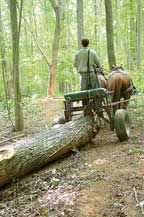Green forestry redefines the profession
Story by Bill Kovarik
They’re not just loggers with horses.
When Jason Rutledge and his colleagues walk into the woods, they are thinking about how to protect the forest ecology, not how quickly they can deliver ten thousand board feet to the mill.
That’s just one difference between traditional forestry and what Rutledge terms restorative forestry.
“We have a strong incentive to leave the forest better than we found it,” Rutledge said, since the main object is to keep returning to a site through short harvest rotations. That way they, as well as the landowner, have an investment in the future of the forest.
Currently, restorative forestry is a niche occupation for Appalachia. It is valued for low-impact forest management and long-term sustainable growth, but it is more expensive than traditional forestry.
However, restorative forestry could become a source of green jobs in places where conservation practices are valued over timber production.
“It’s interesting that the critics of our approach … point out that it is labor intensive and low production,” Rutledge said. “Given the reality of over-production of forest products from conventional, mechanized, fossil-fueled power methods and the resulting decline in the market value of those materials, any method that simply reduces volume and requires more human input means more jobs.”
About 50 people have trained at the Healing Harvest Forest Foundation, founded ten years ago by Rutledge in Copper Hill, Va.
For more information, visit www.healingharvestforestfoundation.org.
Related Articles
Latest News

Leave a comment
Your email address will not be published. Required fields are marked *






Leave a Comment